
THE VOICE OF INTERNATIONAL LITHUANIA
|
VilNews has its own Google archive! Type a word in the above search box to find any article.
You can also follow us on Facebook. We have two different pages. Click to open and join.
|
Archive for 2011
Dates regarding the fall of Soviet communism
- Posted by - (1) Comment

11-13 January 1990 -- one-half of Vilnius’ 600,000 population
demonstrate for pro-independence, to ‘welcome’ visiting
Soviet President Mikhail Gorbachev. Here with the local
communist party leader Algirdas Brazauskas.
By KR Slade
- 1980’s -- economic problems in the USSR; rise of ‘Solidarity’ in Poland
- 1985 -- Soviet President Mikhail Gorbachev announces new Soviet policies of ‘glastnost’ (i.e., ‘political openness’) and ‘perestroika’ (i.e., ‘political and economic restructuring’)
- 3 June 1988 -- in Vilnius, the Lithuanian ‘Sajudis’ (i.e., ‘restructuring’) movement is founded; mostly artists; 17 of the 35 initial members were members of the Communist Party
- 22 October 1988 -- first Sajudis General Congress meets: first organised opposition to the Communist Party
- March-May 1989 -- Sajudis wins legislative seats in the USSR’s highest body of Soviet administration, the Congress of People's Deputies
- February 1989 -- Sąjudis declares Lithuanian ‘independence’, and that Lithuania had been forcibly annexed by the Soviet Union
- May 1989 -- Sajudis proclaims Lithuanian ‘sovereignty’; and declares that Lithuania's incorporation into the Soviet Union was illegal
- 23 August 1989 -- the “Baltic Way”: mass protest of two million people, linking hands in a ‘human chain’, of 650 kilometres: from Vilnius (Lithuania) to Riga (Latvia) to Tallinn (Estonia)
- Bookmark :
- Digg
- del.icio.us
- Stumbleupon
- Redit it
RE: World history was created there and then. In front of our eyes. We were the eye witnesses
- Posted by - (0) Comment
![]() Ref article: https://vilnews.com/?p=10007
Ref article: https://vilnews.com/?p=10007

The border between Poland and the Lithuanian SSR was characterized by miles of high barbed wire fences, a wide no man's land with land mines, and high watchtowers at regular intervals.
Among others, shortly thereafter I witnessed Soviet bullet scars on Ridzene Hotel in Riga, Latvia, where I was staying as an economic expert of an international "blue ribbon" commission.
Once I tried to go for a weekend to Poland by bus via LT on my Canadian passport. I was warmly greeted in Lithuanian by the Sajudis Movement economic border people but stopped a couple of minutes later by the KGB who still were minding the Soviet political border even though LT declared independence back in 1990. For that reason, I was determined to use only Lithuanian or Polish to cross LT-PL border; I am fluent in Russian but I pretended that I do not understand what the KGB were saying when they saw my Canadian passport. They took away my passport and, while the busfull of people were staring at me in total silence, told the bus driver: nu i padarok ty nam privioz (what a gift you brought to us!). Well, now I am in trouble, I guessed. Later, via an LT translator, the KGB told me that this border crossing is for citizens of the USSR and the Polish People's Republic, not for Westerners. They took me off the bus, put on the ashfalt the middle of the road on a hot day under their watchful eye and I had to wait there for an evening bus going back to Vilnius; I did not reach Poland that time.
That was my last encounter with the communist security police; the first one was in Poland when I was just 15 years of age, arrested, interrogated, harassed, otherwise persecuted, etc, and expelled from high school for organizing an anticommunist self-learning group that was collecting evidence of political persecutions in the Soviet occupied LT and trying to bring the evidence to the public.
Valdas Samonis
Toronto
- Bookmark :
- Digg
- del.icio.us
- Stumbleupon
- Redit it
Lithuanian Defense Minister meets NATO to discuss energy security in the Baltics
- Posted by - (0) Comment
![]()
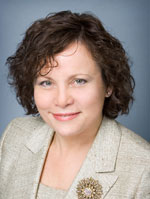
Rasa Juknevičienė, Lithuania’s Minister of National Defence.
Lithuanian Minister of National Defence Rasa Jukneviciene last week met with Gabor Iklody, NATO Assistant Secretary General for Emerging Security Challenges. In the meeting the Lithuanian Minister underscored that expertise and consultations of the Energy Security Centre established in Lithuania could be instrumental to the Alliance.
“We have generated quite a number of ideas how we could serve for the Alliance’s benefit. Our pursuit is to have the Energy Security Centre certified as NATO Centre of Excellence”, said R. Jukneviciene.
When addressing Lithuania’s issues of energy security the Minister expressed concerns about the plans to build nuclear energy plants in neighbouring areas (Belarus and Kaliningrad). She affirmed that one of Lithuanian Government’s priorities was to achieve energy independence from the Russian gas monopoly, therefore Lithuania sought to implement the third energy package of the European Union designed to separate production, supply and transfer activities from ownership rights.
Read more:
http://www.defpro.com/news/details/29763/?SID=885763ddfc2b6649df60e2d75720d27b
- Bookmark :
- Digg
- del.icio.us
- Stumbleupon
- Redit it
- Posted by - (0) Comment
The Global, Economic, Financial Crisis:
We need something new.
A paradigm shift in our thinking

Dr. Ichak Adizes
A blog by Dr. Ichak Adizes
I am in Moscow. Watching the BBC. There is a live round table discussion with very prominent economists as to what to do about the global, financial, economic crisis, in the USA and in Europe. Their concerns: unemployment, declining economic growth, recession, potential for country defaults etc.
Around the table are the managing director of the IMF, the CEO of Pimco, a distinguished professor of economics from Chicago and another person with a heavy Italian accent whose name I failed to record.
To summarize what they are saying: there is a crisis of unemployment, the financial markets are sick and there is declining economic growth. Result: a serious crisis of a potential for a double dip recession and potential for a default by some countries.
They recommend different solutions how to solve the financial crisis, how to improve the rate of employment etc.
The common denominator to their solutions is that they are trying to get back to what we HAD before, which is full employment, healthy financial markets and economic growth.
It will not work.
If we succeed to go BACK, it will be only a temporary solution and the crisis will come back as a tsunami, much bigger, later on.
Why?
Let us analyze the problem.
- Bookmark :
- Digg
- del.icio.us
- Stumbleupon
- Redit it
- Posted by - (1) Comment
The Global, Economic, Financial Crisis:
We need something new. A paradigm shift in our thinking

Dr. Ichak Adizes
A blog by Dr. Ichak Adizes
I am in Moscow. Watching the BBC. There is a live round table discussion with very prominent economists as to what to do about the global, financial, economic crisis, in the USA and in Europe. Their concerns: unemployment, declining economic growth, recession, potential for country defaults etc.
Around the table are the managing director of the IMF, the CEO of Pimco, a distinguished professor of economics from Chicago and another person with a heavy Italian accent whose name I failed to record.
To summarize what they are saying: there is a crisis of unemployment, the financial markets are sick and there is declining economic growth. Result: a serious crisis of a potential for a double dip recession and potential for a default by some countries.
They recommend different solutions how to solve the financial crisis, how to improve the rate of employment etc.
The common denominator to their solutions is that they are trying to get back to what we HAD before, which is full employment, healthy financial markets and economic growth.
It will not work.
If we succeed to go BACK, it will be only a temporary solution and the crisis will come back as a tsunami, much bigger, later on.
Why?
Let us analyze the problem.
Economic growth, unemployment, financial crisis, double dip recession, dangers of default…are not of equal nature.
My analysis is that the driving force is economic growth which provides for full employment and for which healthy financial markets are necessary. That means that economic growth is the goal and full employment and healthy financial markets are the means.
Double dip recession and dangers of default are manifestations of lack of economic growth.
The problem is with the goal. And from there stem the problems with the means.
What is the problem with the goal of economic growth? (My focus here is exclusively on developed nations. What to do with emerging, developing nations, will be addressed at the end of this insight.)
In order to have economic growth, we need to have growing markets.
How do you have growing markets?
One way is to have a growing population. That apparently is not enough. Businesses create markets by creating needs, needs markets did not know they had. Look at the choices offered to consumers on any product in a supermarket. Or a department store. Furthermore, to create markets, to create demand, products are produced with planned obsolescence in mind.
But what is the result of having continuously growing markets as a goal?
It is not sustainable.
If we paraphrase Malthus and instead of population growth say “ economic growth,” and instead of food production say “ natural resources”, we can see that linear progression of economic growth MUST eventually bring us to a point where there are limits to growth: We ARE destroying the planet.
So the solution to the financial, economic, unemployment crisis is not more of what used to be, more economic growth. We need something new. A paradigm shift in our thinking.
Economic growth should not be our deterministic goal, a goal where more is better, a goal we are determined to maximize. Economic growth should now become a constraint goal: no less than x%, when the “ x” is determined by population growth and real needs, not by artificial needs generation.
What should be the deterministic goal than, if it is not economic growth?
Quality of life rather than the standard of living.
Who says we should have full employment? Why not have very early retirement? Why not have only three working days in a week? Earn enough to satisfy your basic needs. Not more and more and more. Just enough.
But a decimated demand and planned unemployment will dry the need for credit and for business growth and put the financial institutions in trouble.
I sure hope so.
The solution to our present problems is not going back to our past but creating a new future.
Now, what about developing, emerging, nations?
For emerging ones and especially those unfortunate to suffer from malnutrition, from lack of health treatment facilities etc there the need for economic growth is REAL.
There, the goal SHOULD BE economic growth but please notice: it is not going back for them. It is going forward. They need economic growth. They never had it.
Here the business community of the developed world should do its best to develop the market, satisfy the needs of the population.
“But there is no market there.” “No buying power will be the excuse.” Right. That is the true challenge to the business community. The true challenge. Not the artificial self created challenge of how to provide more of something people have too much of it already.
Sincerely,
Dr. Ichak Kalderon Adizes
Ref: http://www.adizes.com/blog/?p=990
- Bookmark :
- Digg
- del.icio.us
- Stumbleupon
- Redit it
- Posted by - (3) Comment
Donatas Januta: Reply to Olga Zabludoff re Holocaust in Lithuania
The ‘Green House’ has been
used as a red herring*

Donatas Januta
Dear Olga,
You are absolutely correct that the Jews had little choice but earn their living as merchants and traders. I was not judging how they got there. But regardless how they got there, I was only responding to their activities there, to your claim regarding Jewish contribution to the Lithuanian nation’s economy.
Let’s examine it from another perspective. During czarist Russian times, Jews were excluded from Russia major, or “mother Russia”, and were relegated to what was considered the Pale of Settlement, such as Lithuania. So, rather than comparing the economies of Eastern Europe to Western Europe (though German Prussia, very much part of Western Europe, was right next door to Lithuania) let’s compare the economies of that part of Eastern Europe which had a substantial Jewish population, i.e. Lithuania, with that part of Eastern Europe which did not have any significant Jewish population, i.e., “mother Russia”.
So, Jews participated in Lithuania’s economy, and in mother Russia’s they did not. Yet the economies of both places were pretty much the same on the eve of World War II - depressed and backward. I.e., I don’t see that the Jewish contribution made any difference. I agree, Jews kept their part of the economy in Lithuania running, but there were no noticeable gains or progress comparing to that very backward part of Eastern Europe which was without any significant number of Jews, "mother Russia". Again, I am not assigning any “fault” here, but merely trying to state my understanding of life in that time and place.
You are also absolutely right that the majority of Jewish businesses were mom-and-pop operations run out their front rooms, which usually faced the town’s market square. And I have read poignant stories of Jewish families – parents, children, old folks – waiting anxiously to see what the weather would bring on market day. If it rained it would be a poor market day, and much of their livelihood depended on market day sales. This was true in the inter-war years as well as earlier.
But let me say a thing about monopoly, and also share a personal part of my family’s history as you shared yours. My father’s family comes from Ylakiai region (Yiddish: “Yelok”). During World War I, the entire town, consisting of wooden houses as most towns were then, burned down. While it was being rebuilt, a Jewish family - parents, a grandfather, and a small boy about my father’s age - lived for about a year and a half in my grandparents’ house. Their grandfather died in my grandfather’s house. My father used to play with the Jewish boy, and he used to speak fondly of that year and a half. My grandfather at that time had served six years as a conscript in the czar’s army in the Crimea, and had come back to take over the family farm from his own widowed mother, my great-grandmother.
My father also told me how, riding in their horse-drawn wagon with my grandfather from the marketplace about twelve years later, my grandfather, a former soldier and rugged hard-working farmer, was in tears, because the price he was able to get for the entire year’s crop was not enough to even pay his hired help, much less feed his own family. My grandfather did not have much hired help. He worked the farm mostly with his sons, and hired some extra hands at harvest time. All the traders, the crop buyers, at the market were Jewish, and they all offered the same low price for the crop. These type scenes repeated in marketplaces throughout Lithuania. I think that qualifies as a monopoly and price-fixing. Again, I am not seeking to place fault here on how such a situation came about, but only trying to state how life was in that time and place.
I think that Kubilius’ statement that you quote, was simply an attempt on his part to build bridges and to show that he came to Israel in good faith. His talk about Jewish involvement in Lithuania’s development “of science, economy and culture” is simply him being courteous to his hosts. (Come on, Olga, how much science was developed in Lithuania, anyway? Neither Lithuania’s Jewish merchants, nor Lithuania’s farmers built any cyclotrons in Lithuania, as I recall. Or did I miss that?)
As for Dovid Katz, I had the pleasure to meet him a couple of times in Vilnius a few years back, and have had other communications with him. Back then I found him to be thoughtful and helpful in commenting on some information I needed. But I really feel that, especially recently, he has gone off the deep end and joined Zuroff’s followers on the issue of Jewish and Lithuanian relations. I also note that Yves Plasseraud also makes the point that the much maligned Green House, that is so often and so prominently trotted out by Zuroff and his followers, is not the only Holocaust museum in Lithuania. The Green House is really not that significant of itself, but it has been used as a red herring, and is representative of the less than total honesty in some of the dialogue on these issues.
I would also comment a bit on Irena Veisatė’s note, some of whose writings I have enjoyed in the past. Ms. Veisaitė is absolutely right that the fight of the Jewish partisans against the Nazis was and is completely justified. The atrocities that some of them committed, such as the slaughter of the Kaniukai (“Koniuchy”) villagers, however, were and are criminal. If Ms. Vesaitė reads my first article carefully, I did not refer to the 16th Soviet Lithuanian rifle division as “bandits”. I was merely using that Soviet division as an example that not all groups labeled “Lithuanian” were composed only or even mostly of Lithuanians. The word “bandits” was used by one of the Jewish partizans himself to describe his own partizan group: Joseph Harmatz: “We came in like bandits and, after all, we were robbing the local peasants of their livelihood.”
Dear Ms. Vesaitė, my suggestion that Jews and Lithuanians each grieve separately was not intended to mean that each should ignore the other’s tragedy. I was trying to address the two separately because speaking of them together, i.e., even mentioning them in the same article, causes some people to claim that one is equating the two. I was merely trying to find a way to avoid the discord which so often arises from that.
* Red Herring:http://en.wikipedia.org/wiki/Red_herring
- Bookmark :
- Digg
- del.icio.us
- Stumbleupon
- Redit it
- Posted by - (0) Comment
How I came to Lithuania 21 years ago (5 of 6)
Some private memories by Aage Myhre, VilNews Editor-in-Chief
aage.myhre@VilNews.com
January 1991:
With Landsbergis behind barbed wire and homemade barricades
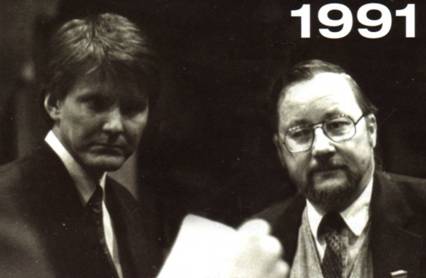
19 January 1991: The author with President Vytautas Landsbergis in the Lithuanian Parliament (Seimas), while the Soviet troops and tanks continue to surround the building.
"Lithuanians, do not resist, your government has betrayed you. Go home to your families and children."
This was the repeated announcement from the Soviet military vehicles with loudspeakers on the roofs, so-called sound trucks, that rolled through the streets of Vilnius in January 1991. But fortunately for Lithuania and the United Europe that we now take more or less for granted, there was a music professor and a complete small nation that wanted it all differently.
Had it not been for this peaceful struggle of recovered freedom against an invasion and occupation, the people of the Baltic States never wanted or agreed to, the map of Europe would most likely have looked quite different today.
If there were those in the West who had not heard of Lithuania before, they almost certainly had by the end of the day 13 January 1991. It was the day that Soviet troops struck in Vilnius. The bloodshed that followed made headlines around the world. The attack was apparently an attempt to stop the Lithuanian independence movement in its very beginning.
When the smoke of the Soviet weapons ceased, more than a dozen people had been killed, hundreds injured. Soviet’s attack, and especially the killings at the TV tower, brought not only fame and sympathy for Lithuania from around the world, it was also a defining moment for the Lithuanians themselves.
The bloodshed meant that a point of no return had been crossed. If there was anyone who until now had believed that a peaceful settlement with Moscow was possible, it was now clear to everyone that such a thing was unthinkable.
To read more, go to our SECTION 13 – THE WORLD IN LITHUANIA
- Bookmark :
- Digg
- del.icio.us
- Stumbleupon
- Redit it
- Posted by - (2) Comment
How I came to Lithuania 21 years ago (5 of 6)
Some private memories by Aage Myhre, VilNews Editor-in-Chief
aage.myhre@VilNews.com
January 1991:
With Landsbergis behind barbed wire and homemade barricades

19 January 1991: The author with President Vytautas Landsbergis in the Lithuanian Parliament (Seimas), while the Soviet troops and tanks continue to surround the building.
"Lithuanians, do not resist, your government has betrayed you. Go home to your families and children."
This was the repeated announcement from the Soviet military vehicles with loudspeakers on the roofs, so-called sound trucks, that rolled through the streets of Vilnius in January 1991. But fortunately for Lithuania and the United Europe that we now take more or less for granted, there was a music professor and a complete small nation that wanted it all differently. Had it not been for this peaceful struggle of recovered freedom against an invasion and occupation, the people of the Baltic States never wanted or agreed to, the map of Europe would most likely have looked quite different today.
If there were those in the West who had not heard of Lithuania before, they almost certainly had by the end of the day 13 January 1991. It was the day that Soviet troops struck in Vilnius. The bloodshed that followed made headlines around the world. The attack was apparently an attempt to stop the Lithuanian independence movement in its very beginning. When the smoke of the Soviet weapons ceased, more than a dozen people had been killed, hundreds injured. Soviet’s attack, and especially the killings at the TV tower, brought not only fame and sympathy for Lithuania from around the world, it was also a defining moment for the Lithuanians themselves.
The bloodshed meant that a point of no return had been crossed. If there was anyone who until now had believed that a peaceful settlement with Moscow was possible, it was now clear to everyone that such a thing was unthinkable.
Professor Vytautas Landsbergis was the central actor in the drama that took place . The colourful, sometimes tempered music professor who was elected Lithuania's president (chairman of the parliament) in March 1990, and from then on become the symbol of the Lithuanian liberation movement. Before the attack in January 1991, his constant talks about breaking free from the Soviet Union, and Lithuania's moral right to do just that, alarmed observers in the West almost as much as in the Kremlin. When the rage was taken completely out of hand in January 1991, Gorbachev seemed as if he did not understand what was happening right in front of him.
Our little Norwegian delegation met with Landsbergis in the parliament on the 19th of January 1991. He lived there, entrenched, protected by his own people. Tens of thousands were ‘camping’ outside the building, inside homemade barricades of concrete blocks and barbed wire. Trucks and tractors were also part of the barricades. In a circle further out stood the Soviet forces, ready to attack when the command word would be given. Fortunately it didn’t happen. The pressure had become strong from all around the world.
We got through the barricades. The Ministry of Foreign Affairs had provided us with appropriate admission papers. It was a moving encounter with a brave man we experienced inside. The little stroke that fell the huge oak. World history was created there and then. In front of our eyes. We were the eye witnesses.

Bonfires outside the Parliament, 19 January 1991.
Photo: Aage Myhre.

Bonfires, day and night, outside the Parliament, January 1991.
Photo: Aage Myhre.

A solid human barricade surrounding the Parliament, January 1991.
Photo: Aage Myhre.

With Landsbergis inside the Parliament, 19 January 1991, and his handwritten greeting to the author.

‘Homemade’ barricades of concrete blocks around the Parliament..
Photo: Aage Myhre.

On the way down Gedimino prospekto towards the Parliament an ice-cold January day 1991.
Photo: Aage Myhre.
- Bookmark :
- Digg
- del.icio.us
- Stumbleupon
- Redit it
![]()
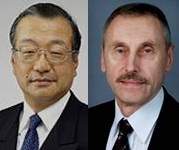
Shozo Saito, chairman of the board of Hitachi-GE Nuclear Energy and Lithuanian Energy Minister Arvydas Sekmokas
Lithuania and an alliance of Japanese Hitachi and U.S. General Electric hope to sign a deal by end-2012 on building a 1,300 megawatt nuclear plant by 2020, a partner said on Thursday.
Lithuania wants to build a new nuclear power plant to cut energy dependence on Russia, with Baltic states and Poland.
"We are excited about the nuclear project in Lithuania," Shozo Saito, chairman of the board of Hitachi-GE Nuclear Energy, told an energy conference in Lithuania capital.
Lithuanian Energy Minister Arvydas Sekmokas, at the same conference, said the government planned to sign the nuclear plant deal by end this year.
"I hope so," Saito told Reuters, when asked, if he saw that date as possible.
However, Sekmokas said that the signing of shareholders and concession agreements might be delayed to the beginning of 2012, if Lithuania's regional partners need more time.
Both Latvia and Estonia have indicated they were interested in the project, but Poland, which plans its own nuclear plants, has not made a final decision.
Read more at:
http://www.reuters.com/article/2011/11/10/lithuania-nuclear-idUSL6E7MA1H920111110
- Bookmark :
- Digg
- del.icio.us
- Stumbleupon
- Redit it
Lithuania opposes dual citizenship referendum
- Posted by - (0) Comment
![]() The Commission of the Seimas of the Republic of Lithuania and the Lithuanian World Community opposes the proposal to hold a referendum on amending the Constitution to expand dual citizenship. The Seimas' decision would be enough, it said.
The Commission of the Seimas of the Republic of Lithuania and the Lithuanian World Community opposes the proposal to hold a referendum on amending the Constitution to expand dual citizenship. The Seimas' decision would be enough, it said.

Five years ago, the Constitutional Court held that the Constitution establishes dual citizenship as rare exception, writes LETA/ELTA.
Politicians continue seeking solutions to amend the Constitution because the provision on the citizenship is in the part of the law that may only be changed by a referendum. The Lithuanian World Community says it would not favour the referendum as it is allegedly even unclear how to formulate the question.
"We heard some lawyers at our sittings saying that it is not the only solution. We urge seeking legal means to solve the issue rather than hold a referendum," Head of the Lithuanian World Community Commission Irena Gasperaviciute told a conference at the Seimas on Thursday.
During the conference, the commission also said that the Lithuanian world community would like to vote online in the coming parliamentary election.
Read more:
http://www.baltic-course.com/eng/legislation/?doc=48593
- Bookmark :
- Digg
- del.icio.us
- Stumbleupon
- Redit it

Kazakhstan's Ambassador to Lithuania Galymjan Koyshibayev arrived in Lithuanian railway station Kena to attend the meeting ceremony of container train Saule that moves from China to European biggest port in Belgium's Antwerpen via the territory of Lithuania, the Kazakh Foreign Ministry reported today.
"The Saule train, the first of such kind, carrying 41 containers with computer software on a full-length 11,000-kilometer route departed from China's Chun Zin on October 28 to move via the territories of Kazakhstan, Russia, and Belarus toward Lithuania and onward to Belgium via Poland and Germany," the report reads.
The train reached Lithuania within a very short period of time - 13 days - after it moved from China via Kazakhstan, Russia, and Belarus, Koyshibayev said. His Chinese counterpart Tong Mingtao said the train Saule is the result of multiyear cooperation and that its arrival in Lithuania marks the beginning of a new era in the field of transportation as it is expected to improve achievements of the transport sectors of all countries concerned.
At the sidelines of Lithuanian President Dalya Gribauskaite's official visit to Kazakhstan in the early October 2011, the heads of the two states agreed to launch train Saule before the end of the year. The Saule train project promises to bring benefits not only economically as railway communication is one of ecologically cleanest kinds of transport.
Implementation of the project is expected to provide further development of "the green" transport linking Europe to Asia.
Read more:
http://en.trend.az/regions/casia/kazakhstan/1956071.html
- Bookmark :
- Digg
- del.icio.us
- Stumbleupon
- Redit it
- Posted by - (2) Comment
Dr. Irena Veisaite : Re Holocaust in Lithuania
We have to build bridges
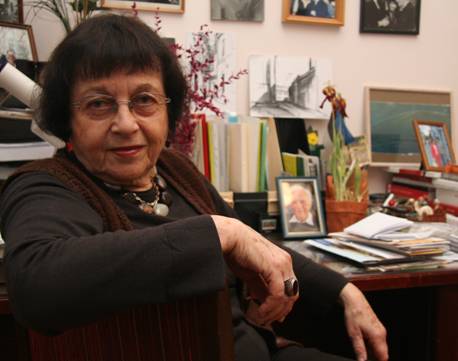
Dr. Irena Veisaite.
Dear Aage,
I fully share with you the view that people are thinking in a different way and have the right to express their position and feelings. But I am also convinced that different arguments should be expressed at the same time, if possible, on the same page.
Dr. Yves Plasseraud is well known as a fighter for minority rights and against any xenophobic trends including also anti-Semitism.
I decided to write this little note only because I noticed some concrete mistakes in the articles of Mr. Bertini and Donatas Januta.
The comments of Dr. Yves Plasseraud did not intend to analyze the history or perception of the Holocaust in Lithuania. His intention was only to react to many non-objective comments in some Jewish press which are misleading. Among Jews are some people who never want to acknowledge positive changes in the perception of the Holocaust in Lithuania, especially by the government, academic circles, educational institutions, including schools and keep repeating the same criticism over and over. Such comments do a lot of harm to the development of Jewish-Lithuanian relations and create a false image of the country. To overcome stereotypes and hatred you indeed need a lot of time and positive thinking from both sides.
Misunderstandings occur sometimes just because of lack of knowledge. This was, in my opinion the case with the article written, maybe, with the best intention by Donatas Jonata. Just a few examples taken from his article:
-The “double genocide” theory is used a lot in Lithuania as shown by J. Mikelinskas popular writings or the existence of the Genocide Museum without even seriously mentioning the Jewish genocide. I know it was recently corrected, but I did not see it yet.
-The 16 soviet division was fighting against Nazi-Germany. Of course “à la guerre comme à la guerre”, some crimes are committed by any army, but to call them just « bandits » is not fair. It was a regular Soviet army unit.
- Soviet partisans of Jewish origin were first of all saving their own lives. They had no way out. Their fight against Nazis is completely justified.
- It was not fully understood during the IIWW, but to treat today Nazi Germany as a liberator or friend of Lithuania would be a big mistake. The Nazis started already during the war a colonization process in Lithuania. We also know now very well their plans for the future, their strategic plan’s “OST”…
- It is true that, in pre WWII Lithuania, Jews lived in many ways separately and tried to preserve their own traditions and faith. But I could not agree that Jews did not do anything in or for the country and its culture... And this is more and more acknowledged today by Lithuanian historians.
I fully agree with Mr. Jonata‘s evaluation of Zuroff, also that ethnic Lithuanians and Jews found themselves in different existential situations at the beginning of the IIWW. This was very well understood by Ona Simaite already in the beginning of the 50-ies, but you should not forget, that the Soviets deported also over 7000 Jews in 1941, that they destroyed Jewish culture during the II soviet occupation, etc.
I think that Mr. Jonata is right not to agree with Mr. Bertini, but his statement that Lithuanians and Jews should grieve their own tragedies separately is not productive. The Holocaust is also part of Lithuanian history as soviet deportations were part of Jewish history, but still not to compare with the total annihilation of the Litvaks during the Holocaust. I would like to emphasize the main statement of Professor Suziedelis, which was published in VilNews».
« If Lithuanians are to “own their own history,” he believes, they must do three things:
- view Jewish history as part of Lithuanian history as a whole. “In the past,” Dr. Suzedelis says, “Jews wrote about Jews and Lithuanians wrote about Lithuanians.” Today, this is changing. An increasing number of ethnic Lithuanians are studying Jewish history.
- understand the Holocaust as the central event of the Nazi occupation. “The genocide of the Jews constitutes the greatest single atrocity in modern Lithuanian history.”
- assess Lithuanian participation in that event “without evasion, without squirming.” “
We have to build bridges.
Irena Veisaite
- Bookmark :
- Digg
- del.icio.us
- Stumbleupon
- Redit it
- Posted by - (2) Comment
Holocaust in Lithuania ; Response to Mr. Didier Bertin.
The Lithuanian authorities are
better than most in the region
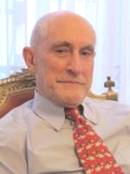
Dr. Yves Plasseraud
By Yves Plasseraud, Paris
I would like to answer briefly to the paper of my compatriot Didier Bertin, posted in VilNews on October 15. Discussion is always positive and I welcome his contribution.
I would first like to point out that my incriminated paper only concerned the attitude of some intellectuals vis-a-vis the Holocaust question in Lithuania and by no means « the martyrdom of the jewish people » in itself.
Now, concerning Bertin’s reaction, I note that although many points he raises are unfortunately true and worth mentioning, I cannot agree with him on several issues :
The Lithuanian authorities are certainly not 100% right in their treatment of the jewish question, but, they are better than most of their counterparts in the region. Presidents Landsbergis and Brazauskas were among the first head of states of Middle Europe to admit WWII crimes again Jews from the part of compatriots and to apologise for them.
I certainly never obliterated the participation of Lithuanians in the Shoah, current neo-nazi parades or the danger of the Double génocide notion. On the contrary, I often denounced them. To mention only one french publication, see the Histoire de la Lituanie, Un millénaire (Armeline, 2009), which I directed : chapters X (A. Anusauskas) & XI (A. Bubnys) on WWI and the Shoah.
The Green house is not the only museum carrying exhibits about the Holocaust : The Panerai museum, the Naugarduko Tolerance Center, and now the Genocide Museum should also be mentioned.
I would be interested to know more about « the many other negative facts » which I forgot in this respect. I have been active in this field for more than 25 years and I do not have the impression to have ever treated the question lightly. I would only remind M. Bertin that, in 1993, I was among the organizers of the first post indépendance conférence in Vilnius on the topic of Lithuanian-Jewish relations1 !
1 See the Acts of the conférence : Atmintes dienos. The Days of Memory, Baltos Lankos, Vilnius, 1995.
- Bookmark :
- Digg
- del.icio.us
- Stumbleupon
- Redit it
- Posted by - (3) Comment
Olga Zabludoff: Reply to Donatas Januta re Holocaust in Lithuania (3)
I dare to hope that our debate
can build bridges to a better
understanding

Olga Zabludoff
Dear Donatas,
The last paragraph in your article of 8 November is a good place to begin my response. I concur that our differences of opinion as well as our areas of agreement should be viewed as an exchange of honest, healthy dialogue. I would even dare to hope that it can begin to build bridges to a better understanding of all the issues we wander into.
For a moment let’s forget about the Lithuanian economy during medieval times. It’s really hard to relate to. Let’s move forward to the more modern economy of the inter-war years. Yes, on the eve of World War 1 Lithuania was economically backward. But that had nothing to do with your claim that the Jews did not contribute to the economy. Like the rest of Eastern Europe at the time, economic development was lagging in Lithuania. Modern economic strides began in Western Europe much earlier than it did in Eastern Europe.
You speak of the Jews having had a monopoly as merchants, traders, shopkeepers and craftsmen. There was no such thing as a monopoly in these small and scattered operations. These were mostly mom-and-pop businesses run out of front rooms in their homes. Of course, like everyone else, they tried to get the best prices they could, but to speak of anti-trust laws and anti-price-fixing laws is totally out of context for that environment.
Another point of importance is that Jews had little choice but to make their living as merchants and traders. Traditionally they were excluded from other occupations and professions. For example, my father had studied engineering in St. Petersburg only to discover when he returned to Lithuania that it was impossible for a Jew to find employment as an engineer. Instead, he became a bank manager in the Jewish Peoples’ Bank.
I still think you are underestimating the contributions of the Jews to the Lithuanian economy, so let me quote from an article which appeared in the Lithuania Tribune of 12/23/10 during the visit of Prime Minister Andrius Kubilius to Israel:
“Prime Minister Kubilius has agreed that the Lithuanian history is unimaginable without the Lithuanian Jewish community that has left a deep imprint on our history and our lives. Since the times of Vytautas the Great, it has always been an integral part of the Lithuanian society, closely involved in the development of science, economy and culture.”
One major difference of opinion in our discussions concerns the definition of “genocide.” The term “genocide” was first applied in 1944 in regard to the attempted extermination of the Jews by Nazi Germany. It clearly refers to the systematic killing or extermination of a whole people. Obviously, and unfortunately, there have been other genocides, but the Soviet regime did not liquidate the majority of Lithuanians. That the Soviets committed terrible crimes against the Lithuanians is a given, that the nation lost political leaders, army officers, clergymen and others is undisputed. But the Lithuanian population was very far from being exterminated.
To say that there were other genocides does not diminish the Holocaust, but to equate the Holocaust with events that were not genocides is to diminish the Holocaust. Comparing incomparables, equating unequals is a distortion of history.
I’m sure that Professor Dovid Katz can easily defend himself, so I won’t venture into that area. From reading his articles in the various media and on his website www.defendinghistory.com I have to assert that he is courageously outspoken and is probably feared and shunned by many in the Lithuanian government. But if they would only listen to him, I believe it would help them accomplish what they say they are sincerely trying to do: to improve their damaged relationship with their small Lithuanian-Jewish community and, consequently, with world Jewry.
Professor Katz analyzes politics and politicians from a vantage point that few other scholars have reached. He should be valued in Lithuania, not feared, if the government wants to deal with its Jewish problems in a realistic way to create a better tomorrow for themselves and their people.
- Bookmark :
- Digg
- del.icio.us
- Stumbleupon
- Redit it
- Posted by - (0) Comment
How I came to Lithuania 21 years ago (4 of 6)
Some private memories by Aage Myhre, VilNews Editor-in-Chief
aage.myhre@VilNews.com
January 1991:
Soviet rolls back

18 January 1991: It is very touching to see how the Balts act to keep their newfound freedom and protect their home country during the very difficult January days of 1991. Here, at the entrance to the Lithuanian Foreign Ministry, the young men have put on homemade clothes that are meant to look like uniforms. They carry rifles and other weapons they have found in their homes. Sand bags have an important symbolic effect. Brave guys!
Photo: Aage Myhre, 18 January 1991.
In the summer of 1990 we heard Parliament President Landsbergis tell us that he feared a new Soviet attack after Lithuania had declared independence in March of that year. “For Gorbachev, our freedom declaration was very hard to accept, although he towards western countries pretended that everything was in perfect order," Landsbergis told us. When we first came to Lithuania the autumn of 1990, finding everything calm and balanced, it was hard to believe that there was any real reason for his fear.
But he's right. In January 1991 Soviet tanks again roll through the streets of the capitals Tallinn, Riga and Vilnius. Soviet Special Forces take control of radio and television stations, surround the parliaments, ready to use armed force against the governments of the three countries. In Vilnius 14 young people are killed in their attempt to stop the attackers.
To read more, go to our SECTION 13 – THE WORLD IN LITHUANIA
- Bookmark :
- Digg
- del.icio.us
- Stumbleupon
- Redit it
VilNews e-magazine is published in Vilnius, Lithuania. Editor-in-Chief: Mr. Aage Myhre. Inquires to the editors: editor@VilNews.com.
Code of Ethics: See Section 2 – about VilNews. VilNews is not responsible for content on external links/web pages.
HOW TO ADVERTISE IN VILNEWS.
All content is copyrighted © 2011. UAB ‘VilNews’.

 Click on the buttons to open and read each of VilNews' 18 sub-sections
Click on the buttons to open and read each of VilNews' 18 sub-sections 















.jpg)



